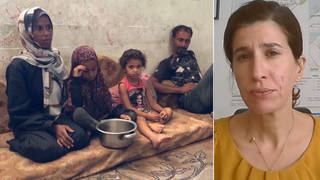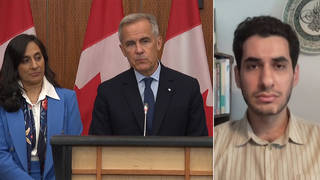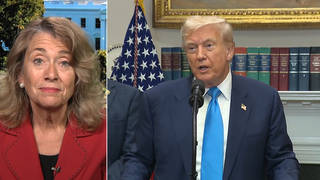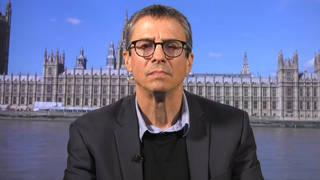
Microsoft fired two workers who protested the company’s ties to Israel’s assault on Gaza at its 50th anniversary celebration last Friday. The workers protested after leaked documents revealed that Microsoft supplies the Israeli military with AI and cloud technology, as well as an Air Force unit known as the Ofek, to build “kill lists.” “We wanted everyone to know that Microsoft’s cloud and AI are the bombs and bullets of the 21st century,” says Vaniya Agrawal, No Azure for Apartheid organizer and a former Microsoft employee who was fired after disrupting an April 4 discussion between current and former Microsoft CEOs, including Bill Gates.
Transcript
AMY GOODMAN: This is Democracy Now!, democracynow.org, The War and Peace Report. I’m Amy Goodman.
We look now at how Microsoft fired two software engineers this week after they protested Israel’s use of Microsoft’s AI and cloud technology in its assault on Gaza. A recent investigation by the Associated Press revealed the Israeli military used this technology to select bombing targets in Gaza and Lebanon. Leaked documents obtained by The Guardian and Drop Site News earlier this year showed the extent to which the Israeli military was using Microsoft’s cloud computing platform and how its use of Microsoft’s AI technology spiked dramatically in the months following October 7, 2023.
The protest began last Friday at Microsoft’s 50th anniversary celebrations as Microsoft AI CEO Mustafa Suleyman presented product updates to an audience that included Microsoft co-founder Bill Gates. This is software engineer Ibtihal Aboussad, who organizes with the Microsoft employee-led campaign No Azure for Apartheid, disrupting and confronting Suleyman.
IBTIHAL ABOUSSAD: Shame on you! You are a war profiteer!
MUSTAFA SULEYMAN: I hear you. Thank you.
IBTIHAL ABOUSSAD: Stop using AI for genocide, Mustafa! Stop using AI for genocide in our region! You have blood on your hands! All of Microsoft has blood on its hands! How dare you all celebrate when Microsoft is killing children? Shame on you all! Shame on you!
MUSTAFA SULEYMAN: Thank you.
IBTIHAL ABOUSSAD: Stop using —
MUSTAFA SULEYMAN: I hear your protest. Thank you.
AMY GOODMAN: A second protest at Microsoft’s 50th anniversary celebrations was led by Microsoft software developer Vaniya Agrawal, who interrupted a discussion between Bill Gates, former CEO Steve Ballmer and the current CEO Satya Nadella.
VANIYA AGRAWAL: Shame on you all! You’re all hypocrites! I’m a Microsoft worker, and I do not consent to my —
SECURITY GUARD: Come outside, please. Thank you. Thank you.
VANIYA AGRAWAL: Fifty thousand —
SECURITY GUARD: Just right out here, this way. Thank you.
VANIYA AGRAWAL: — Palestinians in Gaza have been murdered with Microsoft technology!
SECURITY GUARD: Thank you.
VANIYA AGRAWAL: How dare you!
SECURITY GUARD: Thank you.
VANIYA AGRAWAL: Shame on all of you for celebrating on their blood!
SECURITY GUARD: Right outside, please. Right outside, please.
VANIYA AGRAWAL: Cut ties with Israel!
SECURITY GUARD: Thank you. OK, thank you.
VANIYA AGRAWAL: No Azure for apartheid!
SECURITY GUARD: Can you open that door? Can you open the door? Thank you.
VANIYA AGRAWAL: Microsoft AI kills kids! Microsoft powers genocide!
AMY GOODMAN: Both of the Microsoft workers who protested were fired this week. In October, Microsoft also fired two workers for helping organize an unauthorized lunchtime vigil for Palestinian refugees at its headquarters.
For more, we’re joined now by one of the fired workers, Vaniya Agrawal. She is in Seattle.
Welcome to Democracy now! It’s great to have you with us. Can you start off by talking about exactly what you did, Vaniya, and why you did it?
VANIYA AGRAWAL: Yeah. Good morning, Amy. And thank you so much for having me.
So, just a little background. Throughout 2025, Microsoft has been celebrating its 50th-year anniversary using message centered around its philanthropist impact. But every month, we continue to learn more and more about how Microsoft and its services have enabled and accelerated the genocide in Gaza. As you mentioned, there have been multiple investigations by news outlets, including The Guardian, AP, Drop Site News and others.
And the response from Microsoft on all of this has shed light on its hypocrisy. They decline to comment on the investigations. They evade questions internally. They delete comments from workers asking for explanations. They remove peaceful protesters from premises. And, like you mentioned, they even fired two of our members last October.
So, our campaign, No Azure for Apartheid, felt no celebration should be allowed while Microsoft is playing an active role in the genocide of Palestinians in Gaza. So that’s why our campaign decided to protest their 50th anniversary event. But to be clear, this was a very coordinated and planned protest. Although Ibtihal and I have been the public faces of the disruptions, this protest wouldn’t have happened without all the names and hands behind the campaign.
So, as part of the protest, we disrupted the keynote event. Ibtihal disrupted the head of AI at Microsoft, Mustafa, and I disrupted the Microsoft CEOs, including Bill Gates, Satya Nadella and Steve Ballmer.
After both of our disruptions, we each blasted internal emails to thousands of Microsoft employees, with three goals. We wanted to know — we wanted everyone to know that Microsoft’s cloud and AI are the bombs and bullets of the 21st century. We wanted to make our demands of Microsoft loud and clear, that they must disclose and divest from the IOF, call for a permanent ceasefire and protect the free speech of their employees. And we wanted to encourage others to take action. In a company that has a footprint in all major military infrastructures in Israel, all workers are complicit, and everybody has a part to play.
AMY GOODMAN: Vaniya, how much support do you have among workers? And who feels they can protest, and who doesn’t? Are people right now concerned, especially international workers?
VANIYA AGRAWAL: Yeah, that’s a good question. I believe if there’s one thing we’ve seen in reaction to our protests, it’s just that we’re not alone, that Microsoft workers are outraged. We’ve all been misled into developing and supporting weapons under the guise of AI for good.
And we’re already seeing Microsoft workers take action. Workers everywhere began actions in protest of Microsoft’s direct complicity and in response to a global call to action from Gaza for a strike and civil disobedience. So, earlier this week, these workers refused to work, and sent status messages expressing refusal to have their labor go to Microsoft’s war profiteering. And just last week, Microsoft was also designated as one of the priority boycott targets of the BDS movement, and so we’ve seen tons of people everywhere making material impacts by answering this call to pressure Microsoft and hold these billionaire war criminals accountable. Even within Microsoft itself, we’re seeing workers call out Microsoft and its executives across their social platforms, shutting down job postings for AI roles at Microsoft and even forcing Microsoft to turn off and hide comments on all of their 50th anniversary content.
So, Microsoft’s image is really tarnished. The world now sees that they’re hypocrites, and they can’t hide behind their philanthropy, their mission or their prestige any longer.
As far as who is able to take action, I know that — I recognize my privilege and my position in being able to take a loud stand like this, and not everybody can do that without putting so much on the line — their jobs, their families, their homes. It’s really scary times.
But there are ways to be involved and to take action without putting yourself in the line of fire. Like I mentioned, our protest was a coordinated and planned effort. There were so many folks working behind the scenes that made it happen. And grassroots movements like this have such a variety of needs and roles that assume different levels of risk. And, you know, in the same line of thought, we have power in our numbers. Resistance isn’t a solitary endeavor, and it only survives in the arms of the collective.
So, for this campaign, I would really urge everyone to get involved however they can, answer BDS calls to apply pressure to Microsoft, build community and get involved, sign petitions from campaigns like ours to hold these companies accountable. And for those willing to assume a little more risk, demand that your workplaces divest from Israel. Refuse to have your labor apartheid genocide and — refuse to have your labor power apartheid and genocide. And for those who can’t assume risk, no action is small in this movement. Even things like making a PB&J sandwich for mutual aid is a form of resistance.
AMY GOODMAN: Vaniya, we just have a minute. “No Azure for Apartheid” is your slogan. Can you explain it further? What is Azure, for people who are not in the know?
VANIYA AGRAWAL: Yeah, so, Azure is Microsoft’s cloud technology. And Azure itself provides services and platforms and tools for Microsoft’s customers to build their own services and products and tools and also to get support from Microsoft itself.
AMY GOODMAN: Well, I want to thank you for being with us. We’ll certainly continue to follow what’s happening at Microsoft. Vaniya Agrawal, organizer with No Azure for Apartheid, former Microsoft worker, joined with another protester protesting Israel’s use of Microsoft technology in its assault on Gaza. More than 50,000 — and it’s expected that’s a serious undercount — Palestinians have been killed there in this latest attack since October 2023.
Next up, the director and star of the new Palestinian feature film The Teacher. It premieres tonight. Stay with us.
[break]
AMY GOODMAN: “Fading Memory,” composed by Alex Baranowski for the new film, The Teacher.













Media Options